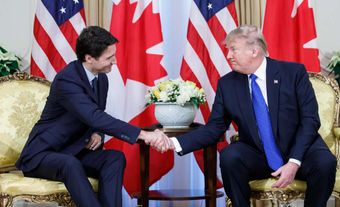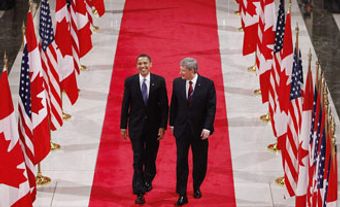The Meng Wanzhou Affair (a.k.a. the case of the two Michaels) was a legal and diplomatic dispute that strained relations between Canada, China and the United States. It began in December 2018 when the RCMP in Vancouver arrested Meng Wanzhou, the CFO of the Chinese technologies company Huawei. They did so on behalf of an American court that wanted Meng extradited to the United States. Nine days later, the Chinese government arrested and detained two Canadians: Michael Kovrig and Michael Spavor. The two Michaels were imprisoned for 1,020 days. They were freed on the same day as Meng — 24 September 2021. The episode marked the emergence of China’s “wolf warrior diplomacy” and demonstrated Canada’s limited diplomatic options as a middle power.
Background
Chinese Civil Engineer Ren Zhengfei founded the Huawei Technologies Company in 1987. A year later, he became its CEO. Based in China, Huawei grew to become the world’s largest information and communications technology company. By 2018, it had nearly 190,000 employees and operations in more than 170 countries, including Canada.
Zhengfei’s daughter, Meng Wanzhou (pronounced mung whan joe), was born in 1972. Sometimes referred to as Cathy or Sabrina Meng, she joined Huawei in 1993 after earning a master’s degree in accounting from Huazhong University of Science and Technology. A company executive since 2003, she played a leading role in restructuring Huawei’s international organization and management systems. She became Huawei’s Deputy Chairwoman of the Board, Rotating Chairwoman, and Chief Financial Officer (CFO).
Meng was a Chinese citizen and had permanent resident status in Canada until 2009. She owned two homes in Vancouver. Three of her four children had been educated at Vancouver schools. Her husband, Liu Xianozong, worked in the city as a venture capitalist.
Arrest and Detainment
On 22 August 2018, a court in Brooklyn, New York, issued an arrest warrant for Meng Wanzhou. The charges were bank fraud, wire fraud, conspiracy to commit bank fraud, and conspiracy to commit wire fraud. The charges were based on Meng allegedly having deceived American financial institutions by allowing one of Huawei’s subsidiary companies, Skycom Tech, to do business in Iran. At that time, the US government had sanctions in place against Iran. An extradition request was approved. It stated that Meng should be arrested and transported to the United States to stand trial.
At 11:10 a.m., on 1 December 2018, Meng landed at the Vancouver International Airport on a flight from Hong Kong. She was planning to change planes and depart for business meetings in Mexico City. However, Canadian border security agents took her aside for immigration screening. Royal Canadian Mounted Police (RCMP) officers then arrested her in compliance with the US extradition order.
In a Vancouver courtroom, Crown Attorney John Gibb-Carsley argued that Meng had broken American laws and should be detained pending extradition to the United States. Gibb-Carsley stated that the Canadian court had no other option, according to the terms of the Canadian-American extradition treaty. Huawei issued a statement saying that Meng had done nothing wrong. China’s Vice Foreign Minister, Le Yucheng, published a harshly worded warning that there would be consequences for Canada if Meng was not immediately released.
Meng was released on $10 million bail on 11 December. Her passport was seized, and she was ordered not to leave Canada, pending a hearing to determine if she would be extradited to the US. She was allowed to live in one of her two Vancouver homes, but with an 11:00 p.m. curfew. She also had to wear a GPS ankle bracelet and pay for the cost of the security detail that enforced her bail conditions. She continued to work from home.
The Two Michaels
Michael Kovrig worked as a diplomat with Global Affairs Canada (GAC) until 2017. At the time of Meng’s arrest, Kovrig was working in Beijing with a non-government organization (NGO) called International Crisis Group. On 10 December, nine days after Meng’s arrest, Kovrig was arrested and detained by Chinese authorities. The state-run Beijing News reported that he was being held for engaging in activities that endangered China’s security.
Michael Spavor is a Canadian entrepreneur. He founded Paektu Cultural Exchange, a Canadian-owned company based in China. It organizes cultural and tourist exchanges with North Korea. (Prior to his arrest, Spavor was best known for arranging for former NBA star Denis Rodman to visit North Korea.) On 10 December, agents from the Chinese National Security Bureau arrested Spavor near the North Korean border. He was detained in a nearby prison and was charged with espionage.
The Canadian media dubbed Spavor and Kovrig the “two Michaels.” American president Donald Trump said he would intervene in the Meng Affair only if doing so would help to secure a trade deal with China. Canada’s then minister of foreign affairs, Chrystia Freeland, stated that the Canadian government would base decisions upon a respect for the rule of law and not the political objectives of a particular country. The Canadian government — under subsequent foreign affairs ministers Francois-Philippe Champagne (November 2019–January 2021) and Marc Garneau (January–October 2021) — worked behind the scenes to have the two Michaels released.

Guilty Verdicts and Imprisonment
In separate trials in China in March 2021, the two Michaels were found guilty of spying. Kovrig was imprisoned in Beijing and awaited sentencing. Spavor was sentenced to 11 years in prison in Dandong. Conditions were unspeakably harsh. Their cells were dank, windowless, and packed with other prisoners. Their food was bad, medical help scant, and exercise was denied. Lights were left glaring 24 hours a day. As the months dragged on, they were allowed only a few phone calls and sporadic visits from Canadian diplomats. Meanwhile, they were interrogated nearly every day.
Legal and Political Maneuvering
From Meng’s first court appearance in Vancouver, her lawyers argued that her arrest had been politically motivated. Many of the arguments they presented in court accused the Canadian Border Services Agency and the RCMP of failing to adhere to proper legal procedures in Meng’s questioning, the taking of her possessions, and her arrest. Courts dismissed all of their motions.
In January 2019, while briefing members of the Chinese media on Canada’s legal procedures, Canada’s ambassador to China, John McCallum, said that the Canadian government had been involved in Meng’s arrest and that her fate now rested with the courts. McCallum — a former politician with a long history of verbal gaffes — also said that it would be a good thing if the Americans dropped their demand for her extradition because it would result in the release of the two Michaels. His comments contradicted the Canadian government’s officially stated position that the two Michaels would not be bargaining chips in negotiations. McCallum apologized and claimed he misspoke. He was fired by Prime Minister Justin Trudeau on 26 January 2019.
Meanwhile, tensions between China and Canada increased. Trudeau did not appoint a replacement for McCallum for months. In June 2019, China announced a ban on the import of Canadian pork and canola products. Canadian exports to China plummeted by 16 per cent. Trudeau hinted at the link between the trade ban and Meng’s arrest, saying that China was “inventing excuses” for its actions. Dominic Barton, a business executive with ties to Asia and previous Canadian governments, was named the new ambassador to China in September 2019.
Hanging over everything was the question of whether Canada would allow Huawei to contribute to the development of the country’s fifth generation (5G) telecommunications network — or exclude it completely. The US and several other allies had already banned Huawei from involvement in their 5G networks, over fears that China might use them to conduct espionage.
For the next two years, Meng’s extradition case moved slowly through the court system. This was due to procedural legal wrangling and to delays caused by the COVID-19 pandemic. The hearing finally concluded in August 2021. However, the judge deferred Meng’s ruling until late fall.
Resolution
In September 2021, more than two and half years after the arrests of Meng, Kovrig and Spavor, American president Joe Biden and Chinese president Xi Jinping discussed the issue during a phone meeting. A few weeks later, Meng agreed to a deferred prosecution agreement with the US government. As part of the agreement, she admitted to misleading investigators about Skycom and Iranian sanctions. She then entered a plea of “not guilty” in relation to the charges against her. (The charges were immediately deferred until 1 December 2022, when they were officially dismissed.) In exchange for admitting that she had misled investigators, the extradition case against Meng was dropped. On 24 September 2021, the BC Supreme Court ended the proceedings against her. That same day, Meng left for China on a chartered flight, while Kovrig and Spavor were released from detention and flown back to Canada.
Aftermath
Through its actions in the Meng Affair, the Chinese government made clear its willingness to engage in so-called hostage diplomacy. That is, China would arrest and detain the citizens of any country in retaliation for actions taken against a Chinese citizen or company. This was seen as a central feature of President Xi Jinping’s “wolf warrior diplomacy” — a much more aggressive, domineering approach than those employed by China in the past. (In addition to the two Michaels, at least six other Canadians were imprisoned in China, including Robert Schellenburg. His 15-year sentence for drug smuggling was increased to a death sentence after a one-day retrial in early 2019.) As a middle power, Canada had limited ability to influence the actions of China and the United States. It could, however, defend Canadian values and the rule of law.
Dominic Barton resigned from his post as Canadian ambassador to China in December 2021, after drawing criticism for pushing for stronger trade ties with China. In May 2022, Innovation Minister Francois-Philippe Champagne announced that Huawei and another Chinese company, ZTE, were both banned from working on Canada's 5G Internet networks. Champagne also said that the two company’s existing 5G infrastructure had to be removed from Canada by 2027. The minister cited security concerns for the government’s decision to keep the Chinese companies away from Canada’s technological infrastructure.
On 23 September 2022, Prime Minister Trudeau appointed Jennifer May, a career public servant who had previously served as ambassador to Brazil, Canada’s new ambassador to China.
See also Canadian-American Relations; Canadian Foreign Relations; Global Affairs Canada (GAC); Diplomatic and Consular Representations.

 Share on Facebook
Share on Facebook Share on X
Share on X Share by Email
Share by Email Share on Google Classroom
Share on Google Classroom


